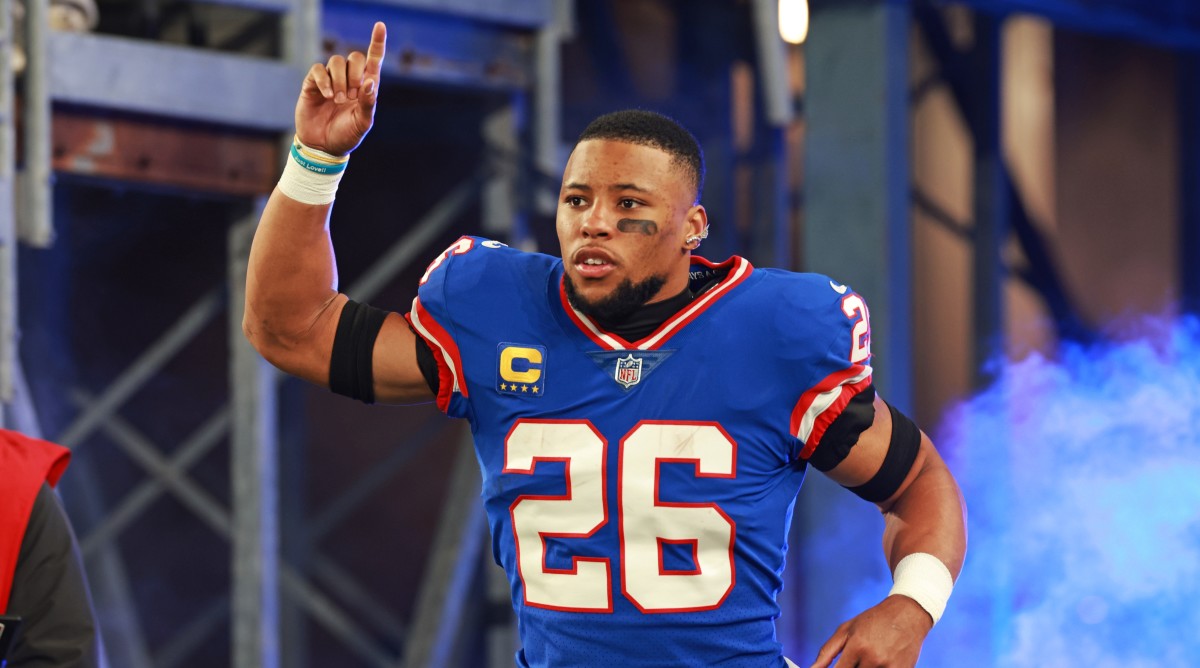Saquon Barkley Was No Longer a Necessity for the Giants
Saquon Barkley agreeing to terms with the Philadelphia Eagles is not the most noteworthy move of the offseason, but it is probably the most poetically satisfying for the player.
He was drafted in 2018 to maximize the tail end of Eli Manning’s career but, instead, got … the tail end of Eli Manning’s career. Barkley was then held up as a buoy for Daniel Jones but, instead, got Joe Judge and Jason Garrett as play-callers, making that largely impossible. After finding some modicum of success under the first real play-caller he’d worked with in Brian Daboll, Barkley wanted to be a franchise player with a contract commensurate with that kind of role. Instead, he got a modified franchise tag, and a soft encouragement to start looking at life outside of East Rutherford, N.J.
In going to the Eagles, Barkley did what we all imagine we’d do when a company, a loved one or something else in our life seems like they are underappreciating us: We go work for, date or sign with their most bitter rival. (I remember not getting into Millersville University and wanting to … write so badly for …Slippery Rock?) In theory, Barkley will have a better chance of success with the Eagles. Even without Jason Kelce, Philadelphia still boasts a strong offensive line and a stout, mobile quarterback who can open up vast running lanes. Barkely is the right player for an Eagles team attempting to rescue the remnants of a 2022 Super Bowl bid.
Of course, we’re all mostly wondering whether the New York Giants made a mistake. For those who follow the team’s history closely, this feels like Justin Tuck going to the Raiders, or the Giants choosing Victor Cruz and allowing Hakeem Nicks to sign with the Indianapolis Colts. Really, only Tuck, who found a late-career swoon in Oakland, was probably worth New York chasing financially.
But we’re arguing momentary satisfaction vs. long-term reality, and the truth is that the Giants could probably end up replicating whatever numbers Barkley puts up with the Eagles from this point onward with a combination of cheaper running backs in a deep free agent pool, plus the draft pick they will eventually get from the compensatory formula.
Because Barkley plays in a larger market, there are questions about loyalty and extraneous value that don’t always exist with other teams and in other cities. He was drafted No. 2 during a complete void of other success and talent. His contributions stood out above and beyond and, thus, he created a kind of personal gravity for himself. Indeed, some of the people who were probably clamoring for the Giants to trade Barkley over the past two years are probably bemoaning his exit today.

To me, Barkley’s value was its greatest when he could take on an exceptionally high volume of work and remove pressure from a quarterback. During his rookie season in 2018, he was targeted a staggering 121 times, acting as a kind of backfield mobility to compensate for the increasingly statuesque Manning. Barkley had 91 receptions that year, gaining more than 700 yards through the air in addition to 261 carries and more than 1,300 rushing yards. No matter how good a player, it’s impossible to project a running back going into his age-27 season to have that kind of impact. It’s also hard to project any numbers if the Giants are thinking of starting over at the quarterback position and are truly in need of an every-down back who will soak up a ton of behind-the-line catches and runs straight into the line of scrimmage. You also need to factor in Barkley’s injury history after he’s played only two complete seasons.
We bring this up a lot, but the Giants desperately needed to cut ties with everything resembling the Dave Gettleman era. It’s not that Gettleman did an awful job. Rather, it’s that he imagined a team that could be competitive in theory but failed to adequately find the right people to coach it. Those coaching staffs eventually expired one after the other, while the right players either aged out, got injured or became more sensible to trade.
Making the playoffs in Daboll’s first season seriously impacted that process of weed removal. So, instead of hastening the ouster of these players in exchange for draft capital or valuable repetitions for younger players, it made them something of a momentary necessity. And Barkley defined that better than anyone.
That necessity forced Barkley and the Giants to hold onto one another like castaways on an eroding island. But Barkley’s rescue ship has now arrived. Solemnly wave if you wish, Giants fans, but in the long term, replacing him will be cheaper and more efficient. And that is the true definition of winning free agency, far above the emotional satisfaction.
